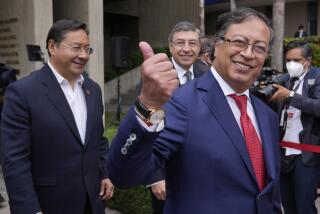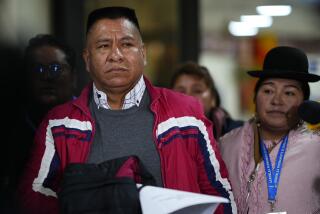Pope Wraps Up Weeklong Latin Visit With Caribbean Isle Stop
- Share via
CASTRIES, St. Lucia — Pope John Paul II wrapped up a weeklong Latin American mission with a stop on this Caribbean island Monday, after castigating Colombia’s drug traffickers and once again urging that country’s guerrilla forces to lay down their arms.
The Roman Catholic pontiff’s trip spanned Colombia from its Pacific to Caribbean coasts over the past week. He pleaded for a better break for the nation’s poor, urged respect for Indian rights and lamented the persistent violence that has plagued South America’s northernmost nation for three decades.
Before leaving for St. Lucia on Monday, the Pope summarized his Colombian themes during a final speech in Barranquilla, a river port city on the Caribbean coast.
“Together with these problems exist also those social evils that your bishops have recently denounced: terrorist violence, a guerrilla war, torture and kidnaping, the abuse of power and crimes that go unpunished, the use of drugs and the abominable crime of drug trafficking,” he declared.
Departure From Speech
In a departure from his long-planned speech in Barranquilla’s Plaza of Peace, John Paul repeated a call that he made on July 2 in Bogota, the Colombian capital, for the country’s disparate guerrilla groups to lay down their arms.
Although the Pope repeatedly endorsed the same demands for social justice espoused by Colombia’s guerrilla groups, he refused to meet privately with their representatives to mediate in their conflict with the government. He also condemned the violence and terrorism that have marked their struggle.
The main guerrilla group, M-19, pledged before John Paul’s visit to refrain from violence while he was in the country.
The trip was unmarred by incidents except for a mysterious power blackout during a papal speech in the old Spanish colonial port of Cartagena on Sunday night. The loudspeaker system at the city’s Chambacu Park failed, and the platform from which the Pope was speaking was plunged into darkness for four minutes. He paused, then continued to read the speech when an emergency generator was switched on.
Blamed on Short Circuit
Organizers blamed the power failure on a short circuit.
But anonymous telephone callers claimed responsibility for the blackout on behalf of the M-19, the same group that laid siege to the Palace of Justice in Bogota last November. Ninety-five people, including 11 justices of the Supreme Court, were killed in the attack by government forces that broke the siege.
According to a Cartagena newspaper report on Monday, an anonymous caller said the M-19 wanted to demonstrate by the blackout that it was present and could have committed a damaging act against the Pope if it had wished. Local police said they were skeptical of the claim, dismissing it as the call of a crackpot.
Cartagena Mayor Angel Martinez said the blackout before 200,000 spectators was “a criminal act committed against the city during the visit of the Pope. I don’t know who (was responsible); the only thing I can say is that it was criminal hands.”
Warmth of Islanders
In St. Lucia, an English-speaking Caribbean island of about 125,000 people, 90% of them black and Catholic, the Pope appeared happy to bask in the cheerful warmth of the islanders and to skip the usual calls for social, spiritual and economic reform that often enliven his appearances.
His message to the St. Lucians was entirely a religious one, outlining what he called “the gift of faith.” During a seven-hour stopover on the island en route to Rome, the pontiff delivered three spiritual addresses, one of them at a 2 1/2-hour Mass in Castries, the island’s capital.
Following a visit with St. Lucia’s governor general, Sir Allen Montgomery Lewis, John Paul departed for Rome in a chartered Boeing 747 of the Colombian airline Avianca.
More to Read
Sign up for Essential California
The most important California stories and recommendations in your inbox every morning.
You may occasionally receive promotional content from the Los Angeles Times.










